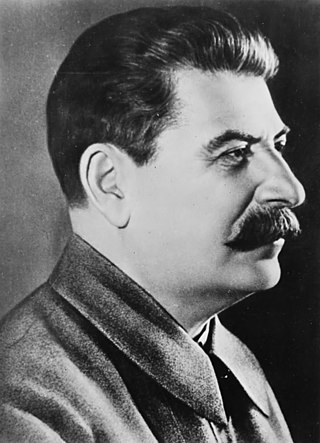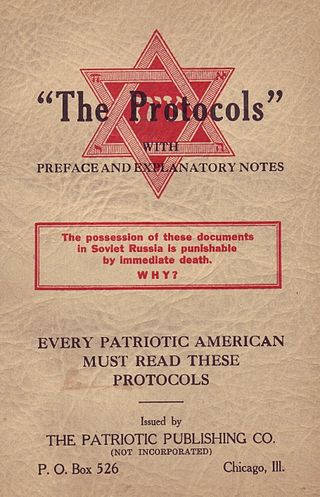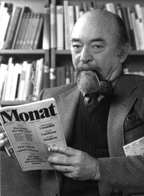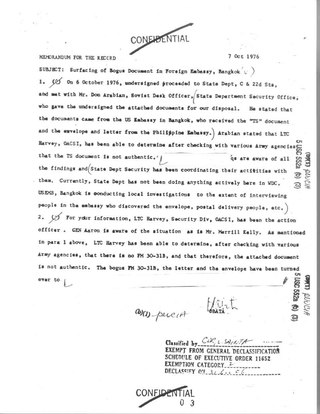Related Research Articles

Propaganda is communication that is primarily used to influence or persuade an audience to further an agenda, which may not be objective and may be selectively presenting facts to encourage a particular synthesis or perception, or using loaded language to produce an emotional rather than a rational response to the information that is being presented. Propaganda can be found in a wide variety of different contexts.

Totalitarianism is a political system and a form of government that prohibits opposition political parties, disregards and outlaws the political claims of individual and group opposition to the state, and controls the public sphere and the private sphere of society. In the field of political science, totalitarianism is the extreme form of authoritarianism, wherein all socio-political power is held by a dictator, who also controls the national politics and the peoples of the nation with continual propaganda campaigns that are broadcast by state-controlled and by friendly private mass communications media.

Psychological warfare (PSYWAR), or the basic aspects of modern psychological operations (PsyOp), has been known by many other names or terms, including Military Information Support Operations (MISO), Psy Ops, political warfare, "Hearts and Minds", and propaganda. The term is used "to denote any action which is practiced mainly by psychological methods with the aim of evoking a planned psychological reaction in other people".

Black propaganda is a form of propaganda intended to create the impression that it was created by those it is supposed to discredit. Black propaganda contrasts with gray propaganda, which does not identify its source, as well as white propaganda, which does not disguise its origins at all. It is typically used to vilify or embarrass the enemy through misrepresentation.

The East German uprising of 1953 was an uprising that occurred in the German Democratic Republic from 16 to 17 June 1953. It began with strike action by construction workers in East Berlin on 16 June against work quotas during the Sovietization process in East Germany. Demonstrations in East Berlin turned into a widespread uprising against the Government of East Germany and the ruling Socialist Unity Party the next day, involving over one million people in about 700 localities across the country. Protests against declining living standards and unpopular Sovietization policies led to a wave of strikes and protests that were not easily brought under control and threatened to overthrow the East German government. The uprising in East Berlin was violently suppressed by tanks of the Soviet forces in Germany and the Kasernierte Volkspolizei. Demonstrations continued in over 500 towns and villages for several more days before eventually dying out.

The Cold War was a period of geopolitical tension between the United States and the Soviet Union and their respective allies, the Western Bloc and the Eastern Bloc, that started in 1947, two years after the end of World War II, and lasted until the fall of the Soviet Union in 1991.

Melvin Jonah Lasky was an American journalist, intellectual, and member of the anti-Communist left. He founded the German journal Der Monat in 1948 and, from 1958 to 1991, edited Encounter, one of many journals revealed to have been secretly funded by the CIA through the Congress for Cultural Freedom (CCF).

Psychological operations (PSYOP) are operations to convey selected information and indicators to audiences to influence their motives and objective reasoning, and ultimately the behavior of governments, organizations, groups, and large foreign powers.
The Information Control Division (ICD) was a department of the Office of Military Government, United States (OMGUS) during the early part of the post-war American occupation of Germany following World War II focused on controlling and altering German media to promote democratic values and to move Germany away from Nazism. Formed on 12 May 1945 from the Psychological Warfare Division of SHAEF (PWD/SHAEF), the ICD was led by Robert A. McClure, with a mission defined as:
to provide the Germans with information, which will influence them to understand and accept the United States programme of occupation, and to establish for themselves a stable, peaceful, and acceptable government. Such information will impress upon the Germans the totality of their military defeat, the impossibility of rearmament, the responsibility of the individual German for war and atrocities, the disastrous effects of the structure and system of National Socialism on Germany and the world, and the possibility that through work and cooperation Germany may again be accepted into the family of nations.

The National Committee for a Free Germany was an anti-fascist political and military organisation formed in the Soviet Union during World War II, composed mostly of German defectors from the ranks of German prisoners of war and also of members of the Communist Party of Germany who moved to the Soviet Union after the Nazi seizure of power. Although it initially conducted primarily propaganda and psychological warfare activities, later it formed small military units known as Combat Units and Partisan Units which were sent to the Wehrmacht rear areas where they combined propaganda with collecting intelligence, performing military reconnaissance, sabotage and combat against the Wehrmacht, and to East Prussia, where they attempted to launch a popular guerilla movement. Towards the end of the war its volunteers were sent at the front where they participated in combat with the Nazis. The creation of the organisation formed the Movement for a Free Germany, the anti-Nazi German movement in countries beyond Germany, including the occupied Greece (AKFD) and France (KFDW).

The US Army Field Manual 30-31B, dubbed the "Westmoreland Field Manual," purportedly outlined a strategy called the "strategy of tension," wherein violent attacks are orchestrated and blamed on left-wing groups to justify government action. However, most scholars believe it to be a Cold War-era hoax conducted by Soviet intelligence services.

Ulenspiegel was a bi-weekly German satirical magazine published in Berlin after World War II. The magazine was an important cultural outlet in the new era of democracy and freedom following the fall of the Third Reich. Its first issue was published on 24 December 1945. The publishers were Herbert Sandberg and Günther Weisenborn; editors included Wolfgang Weyrauch, with Karl Schnog becoming editor-in-chief in 1947. Its success was stymied by politics, as the editors first clashed with the American authorities in occupied Germany in 1948, accused of being too "left-wing", and then after the magazine moved to the Soviet sector of Berlin, ran afoul of the Communists in 1950. The remaining publisher, Sandberg, lost his license to publish in 1950.
Edward Hunter was an American writer, journalist, propagandist, and intelligence agent who was noted for his anticommunist writing. He was a recognized authority on psychological warfare. Both contemporary psychologists and later historians would criticize the accuracy and basis of his reports on brainwashing, but the concept nevertheless became influential in the Cold War-era United States.

The Kampfgruppe gegen Unmenschlichkeit (KgU) was a German anti-communist resistance group based in West Berlin. It was founded in 1948 by Rainer Hildebrandt, Günther Birkenfeld, and Ernst Benda, and existed until 1959. Hildebrandt would later establish the Checkpoint Charlie Museum.

The Crusade for Freedom was an American propaganda campaign operating from 1950–1960. Its public goal was to raise funds for Radio Free Europe; it also served to conceal the CIA's funding of Radio Free Europe and to generate domestic support for American Cold War policies.
Radio propaganda is propaganda aimed at influencing attitudes towards a certain cause or position, delivered through radio broadcast. The power of radio propaganda came from its revolutionary nature. The radio, like later technological advances in the media, allowed information to be transmitted quickly and uniformly to vast populations. Internationally, the radio was an early and powerful recruiting tool for propaganda campaigns.

Political warfare is the use of hostile political means to compel an opponent to do one's will. The term political describes the calculated interaction between a government and a target audience, including another state's government, military, and/or general population. Governments use a variety of techniques to coerce certain actions, thereby gaining relative advantage over an opponent. The techniques include propaganda and psychological operations ("PsyOps"), which service national and military objectives respectively. Propaganda has many aspects and a hostile and coercive political purpose. Psychological operations are for strategic and tactical military objectives and may be intended for hostile military and civilian populations.

Kultur im Heim was an East German women's magazine specializing on home decoration and home design. The magazine was published between 1956 and 1989.
New generation warfare or NGW is a Russian theory of unconventional warfare which prioritizes the psychological and people-centered aspects over traditional military concerns, and emphasizes a phased approach of non-military influence such that armed conflict, if it arises, is much less costly in human or economic terms for the aggressor than it otherwise would be. It was first enunciated in 2013 by Valery Gerasimov as part of his Gerasimov Doctrine.
Neuer Weg was the official media outlet of the East German ruling party, Socialist Unity Party (SED). Its subtitle was organ des Zentralkomitees der SED fur Fragen des Parteilebens. The magazine was in circulation between 1946 and 1989.
References
- 1 2 3 John Brown Mason (June 1959). "Government, Administration, and Politics in East Germany: A Selected Bibliography". American Political Science Review . 53 (2): 517. doi:10.2307/1952161. JSTOR 1952161. S2CID 251095627.
- 1 2 Thomas Rid (2020). Active Measures: The Secret History of Disinformation and Political Warfare. New York: Farrar, Straus and Giroux. p. 44. ISBN 978-0-374-71865-7.
- 1 2 3 4 "The Press: Armed with a Snicker". Time . 12 January 1959. Retrieved 10 May 2022.
- 1 2 "Speaking of Pictures". Life . Vol. 36, no. 14. 5 April 1954. p. 18. ISSN 0024-3019.
- ↑ Dairo Pasquini (2020). "Longing for Purity: Fascism and Nazism in the Italian and German Satirical Press (1943/1945–1963)". European History Quarterly . 50 (3): 469. doi:10.1177/0265691420932251. S2CID 221015170.
- 1 2 3 "Tarantel, satirical magazine, No. 16". Akg-images. Retrieved 10 May 2022.
- 1 2 Peter Busch (Summer 2014). "The "Vietnam Legion": West German Psychological Warfare against East German Propaganda in the 1960s". Journal of Cold War Studies . 16 (3): 183. doi:10.1162/JCWS_a_00472. S2CID 57569912.
- ↑ Christian F. Ostermann (2021). Between Containment and Rollback: The United States and the Cold War in Germany. Stanford, CA: Stanford University Press. p. 152. ISBN 978-1-5036-0763-7.
- ↑ Giles Scott-Smith (2012). Western Anti-Communism and the Interdoc Network: Cold War Internationale. Basingstoke; New York: Palgrave Macmillan. p. 48. ISBN 978-1-137-28427-3.